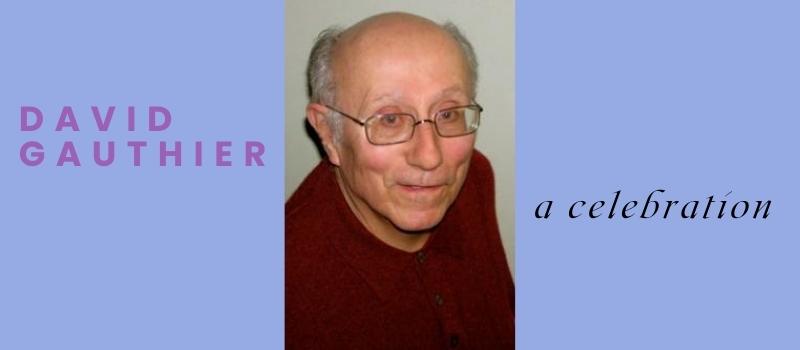
A few months ahead of his 90th birthday, in May 2022, David Gauthier, professor emeritus and former chair of the Department of Philosophy at U of T, published not one but two volumes of collected writings with Oxford University Press. The achievement reflects perfectly Gauthier’s eminence in philosophy and the depth of his intellectual engagement. Yet those who know him, perhaps especially at the University of Toronto, think of him not only as a distinguished scholar but also as a dexterous administrator unafraid to break new ground, and as a congenial colleague and friend. A shining star of the field, one might say—quite literally, as we will see.
Gauthier’s latest books, Rational Deliberation (OUP, 2022) and Hobbes and Political Contractarianism (OUP, 2022), both edited by Susan Dimock, Claire Finkelstein, and Christopher W. Morris, showcase his two areas of greatest intervention: practical rationality and moral theory (in Gauthier’s case, a neo-Hobbesian social contract theory of morality).
Starting with the work of John Rawls, contractarian ethical and political theories enjoyed a renaissance in the final quarter of the twentieth century. Gauthier contributed to and stirred the ongoing debate by arguing—in contrast to Rawls—that moral principles are principles of rational choice. Individuals make choices, he proposes, on an agreed basis of cooperation, rather than according to what would give any one actor the greatest expectation of value. Under what he calls “constrained maximization” everyone ends up better off.
Gauthier’s thinking on rationality, morality, and the history of philosophy, especially concerning the writings of Thomas Hobbes and Jean-Jacques Rousseau, have resulted in numerous articles and multiple influential books, including The Logic of Leviathan: The Moral and Political Theory of Thomas Hobbes (Clarendon, 1969), Morals by Agreement (OUP, 1986), Moral Dealing: Contract, Ethics, and Reason (Cornell, 1990), and Rousseau: The Sentiment of Existence (CUP, 2006). The latter also showed off Gauthier’s sense of humour: tongue-in-cheek, the author in the book’s preface takes himself to task in an interview with an imaginary critic about writing yet “[a]nother book on Rousseau.”
Gauthier began his academic pursuits with an Honours bachelor’s degree in Philosophy and English at U of T in 1954. A master’s degree from Harvard followed, then a doctorate from the University of Oxford in 1961. He returned to teach at U of T in 1958, where he remained for 22 years, before leaving again for the United States. Attaining the rank of full professor in 1967, Gauthier began that same year to serve as what was then called “graduate secretary,” ultimately advancing to the position of department chair in 1974.
In that role, Gauthier faced a delicate task: the absorption of three separate college Philosophy departments (those of Victoria, Trinity, and St. Michael’s) into the U of T Department of Philosophy. With diplomacy and the meticulous methodology that would become his administrative trademark, Gauthier managed to overcome considerable hesitation on the part of the college departments and launch a new era for Philosophy at U of T. He would stay chair of the department until 1979, the same year he was elected a Fellow of the Royal Society of Canada.
Since 1980, he has been a member of the Department of Philosophy at the University of Pittsburgh, which he chaired between 1983 and 1987 and where he was appointed a Distinguished Service Professor in 1986. He has also been a senior research fellow at the Center for Philosophy of Science and has held visiting professorships at UCLA, the University of California, Berkeley, Princeton, UC Irvine, and the University of Waterloo.
Yet no matter how impressive his scholarly and administrative achievements, says Professor Emeritus Wayne Sumner, “I prefer to speak about David the person.” He fondly recalls heady debates among young faculty colleagues in a discussion group called the Vicious Circle, late-afternoon libations at the Faculty Club, and a pulsating eagerness for change. “I was very fortunate to have David as a colleague,” Sumner says. “I will never forget his congeniality, including the parties he and [his wife] Joan hosted in the Republic of Rathnelly, but I am also grateful for the rigorous standards he demanded, of students, faculty, and administrators. In my further career, as both a philosopher and an administrator, I aspired to live up to those standards.”
Which returns us to the subject of Gauthier’s stardom: Beyond serving as a model of intellectual rigour and administrative strategy, the man whose 90th birthday we celebrate on September 10, 2022, in fact has a celestial body named after him: Asteroid (15911) Davidgauthier. Speak about a life well lived.
—Petra Dreiser
SHARE